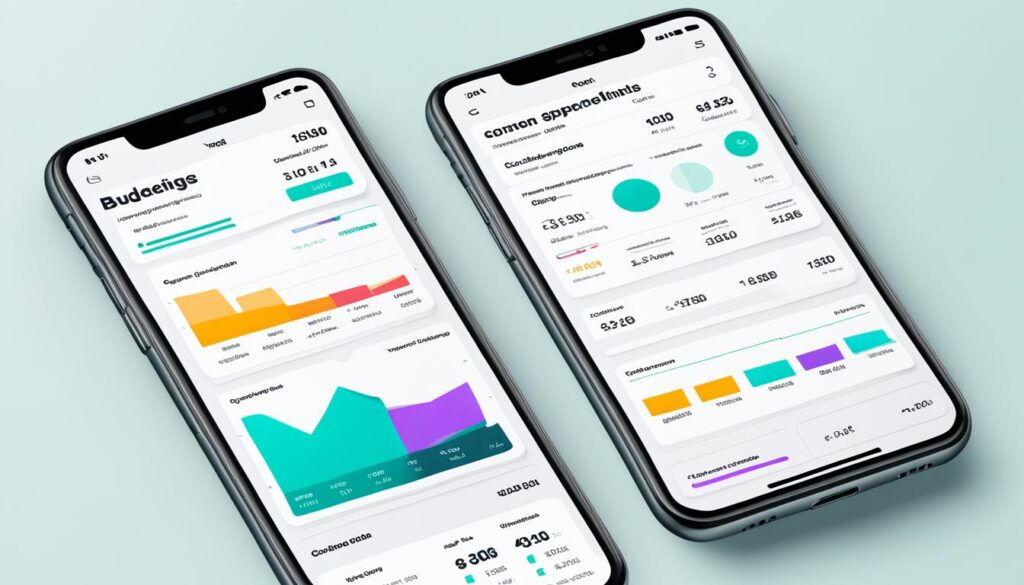In a world where technology and personal finance become increasingly intertwined, tech-savvy millennials are on the lookout for the best AI budgeting apps for millennials that combine convenience with smart financial management. Gone are the days of manual ledger entries and cumbersome spreadsheets. The new era belongs to budgeting apps with artificial intelligence – intelligent digital partners that navigate the complexities of financial planning with ease.
This drive towards innovation has given rise to a suite of best budgeting apps for young adults, designed not just to track spending but also to offer insights and strategies tailored to individual habits and goals. These pioneering tools are redefining money management and setting new benchmarks for what smart budgeting looks like in the modern age.
Key Takeaways
- The shift towards AI budgeting apps reflects the growing demand for personal finance tools that offer more than basic functionality.
- Millennials expect budgeting apps to provide predictive analytics and personalized financial advice to help them make informed choices.
- AI budgeting apps help users automate the process of saving and managing finances, which aligns with the fast-paced lifestyle of young adults.
- The focus on building financial literacy is keen, with apps designed to be user-friendly and engaging to maintain consistent interaction.
- Affordable options make robust financial planning tools accessible, democratizing quality financial advice for a broader user base.
Embracing the Digital Age: AI Budgeting Revolution
The landscape of personal finance is undergoing a seismic shift, introducing millennials to AI based budgeting apps that are transforming the way we think about and manage our money. This digital revolution is characterized by a move from traditional, manual budget tracking to dynamic, AI powered budgeting apps that offer real-time insights and data-driven guidance.
With the dawn of this new era, individuals are seeking out budgeting apps for millennials with AI to assist in making more informed financial decisions, tailored specifically to their unique personal needs and lifestyle. Through automated processes and machine learning, these sophisticated tools analyze spending habits, predict future expenses, and carve a personalized path towards financial stability and growth.
From Manual to Machine: The Rise of AI in Personal Finance
Once reliant on spreadsheets or the fiscal prudence of paper and pen, the modern millennial now looks towards AI driven solutions that streamline budgeting into an efficient and stress-free task. The integration of AI in personal finance tools aligns perfectly with the fast-paced, tech-embedded lifestyles of young adults. It represents a forward leap from mere tracking to offering proactive financial planning and effortless budget management.

Understanding AI’s Impact on Budget Planning and Tracking
The power of AI within the realm of personal finance cannot be overstated. It lays the groundwork for a more detailed and granular understanding of one’s financial health. These AI budgeting platforms do much more than track expenses; they utilize predictive modeling and behavioral analysis to adapt and forecast future financial scenarios, equipping users with the knowledge to preemptively adjust spending and savings strategies. The undeniable efficiency and accuracy of these AI based budgeting apps make them indispensable allies in the quest for fiscal responsibility and long-term wealth creation.
The Advantages of Using AI Powered Budgeting Apps
Fiscally conscious millennials are turning to AI based budgeting apps to simplify and enhance their financial life. Assessing the reasons behind this trend highlights several compelling advantages that AI budgeting tools for millennials bring to the table.
Automation of Savings stands out prominently. It’s not just about tracking where money is going but seamlessly placing it where it needs to grow. AI-driven apps relish the task of scheduling your savings, without you having to lift a finger after initial setup.
Next comes the Personalized Financial Notifications. Instead of generic advice, AI learns about your spending habits and offers tailored alerts. This kind of personalized communication ensures that financial tips are not just heard but also heeded.
Perhaps most impressive is the Predictive Financial Advice – a hallmark of the top budgeting apps for millennials. These applications are not simply reactive but proactive, forecasting potential economic scenarios based on your financial behavior patterns. You don’t just see where you’ve been; you get a clear view of where you’re potentially heading, incredibly valuable for strategic decision-making.
The detailed analysis and actionable insights provided by AI budgeting tools for millennials can revolutionize the user experience, but let’s examine through a comparative table what these features mean in practical terms:
| Feature | Advantage | Impact on Millennials |
|---|---|---|
| Automated Saving | Effortless setting aside of funds | Builds savings without active input |
| Personalized Alerts | Timely, relevant financial advice | Encourages smarter spending decisions |
| Predictive Analytics | Forecasts financial trends | Improves preparation for future expenses |
| Spending Analysis | Intelligent breakdown of expenses | Offers insights into spending habits |
| Goal Setting and Tracking | Monitors progress towards financial goals | Motivates users to stay on financial course |
Armed with such advantages, millennials can navigate their financial course with greater confidence. It’s no hype to say that these apps are like having a financial advisor in your pocket, one that never sleeps, constantly learning and evolving with you.
Top 10 Best AI Budgeting Apps for Millennials: Mint, YNAB, Cleo, Wally, Empower, HoneyDue, Plum, Emma, Snoop and Chip
In the search for the best AI budgeting apps for millennials, a select few have risen above the rest, offering not just state-of-the-art technology but also user-centric interfaces, automated functionalities, and financial intelligence. Critical to the success and mass adoption among millennials, these platforms – Mint, YNAB (You Need A Budget), Cleo, Wally, Empower, HoneyDue, Plum, Emma, Snoop, and Chip – stand out through a combination of innovative features and realistic, actionable financial strategies.
The importance of AI in personal finance grows ever more apparent, particularly for the tech-forward millennial generation seeking affordable budgeting apps for millennials that do not compromise on quality or capabilities. These apps embed deep learning algorithms to dive into the nuances of individual financial patterns, thereby crafting a nuanced and proactive budgeting experience.

Features that Set Top AI Budgeting Apps Apart
Let’s delve into what makes these applications the top contenders. It starts with their ability to automate the categorization of expenses, minimizing manual entries and errors. Coupled with this is the advantage of setting and tracking financial goals, ensuring that users stay aligned with their financial aspirations. Then comes the feature of personalized notifications, which fortify financial accountability through customized advice and alerts.
Another game-changer is their intuitive understanding of each user’s transactional behavior, leading to a tailored budgeting plan that aligns with their lifestyle and financial objectives. This amalgamation of features sets the stage for a transformative user experience and a noteworthy shift in how millennials manage their money.
Case Studies: Success Stories of AI Assistance in Budget Management
Success stories abound when examining the impact that AI budgeting tools like Mint and YNAB have on their users’ financial health. From individuals who have curtailed impulsive spending thanks to Cleo’s witty yet poignant monetary guidance, to couples who have synergized their budgeting practices through HoneyDue, the testimonials speak volumes. Whether it’s the rising savings balance with the help of intelligent algorithms in Plum or the debt obliteration strategies recommended by Empower, these case studies bring to light the tangible benefits of using budgeting apps for millennials with AI.
Understanding the multifaceted advantages of these applications comes best through a visual comparison. A table following this paragraph showcases the features these apps offer and the unique benefits these features provide to millennial users. Prioritizing affordability and accessibility, these apps affirm that sound financial management and growth do not require deep pockets – just smart technology.
| AI Budgeting App | Key Feature | User Benefit |
|---|---|---|
| Mint | Automated Expense Tracking | Simplifies budgeting by categorizing transactions |
| YNAB | Financial Goal Tracking | Keeps financial targets front and center |
| Cleo | Personalized Financial Coaching | Delivers financial guidance with engaging dialogue |
| Wally | International Budgeting Support | Facilitates budgeting across multiple currencies |
| Empower | Customizable Reports | Provides detailed insights into spending patterns |
| HoneyDue | Joint Finance Management | Enables couples to collaborate on budgeting |
| Plum | Automated Savings | Effortlessly segments savings from spending |
| Emma | Subscription Monitoring | Helps avoid recurring charges for unused services |
| Snoop | Spending Analytics | Offers insights for smarter financial decisions |
| Chip | AI Savings Algorithm | Optimizes savings based on spending habits |
How AI Budgeting Tools Are Changing Financial Behaviors
As the digital age progresses, AI powered budgeting apps are significantly impacting the way millennials approach their finances. By leveraging the capabilities of budgeting apps with artificial intelligence, young adults are finding smarter, more efficient ways to manage their money. These innovative tools go beyond basic budgeting functions, offering a wealth of data-driven insights that induce positive changes in financial behavior.
Understanding these shifts in financial management and the contributing factors is critical for anyone looking to enhance their fiscal prudence. With the rise of budgeting apps for millennials with AI, users are ushered into an era where financial decisions are not just informed, but predicted, shaped, and optimized by technology.
Smart Saving: How AI Helps in Making Informed Financial Decisions
The integration of artificial intelligence into budgeting tools has ushered in an era of smart saving, where algorithms assist users in making financially beneficial decisions. These ai budgeting tools for millennials delve deep into spending patterns, provide forecasts, and set personalized saving targets that resonate with individual goals.
Unlike traditional budgeting methods, AI introduces a proactive approach by anticipating future financial situations based on current habits. These insights empower users to optimize their savings strategy, create emergency funds, and plan for long-term investments, all leading to a more secure financial future.
The Psychology Behind Budgeting Apps and User Engagement
The design and functionality of AI powered budgeting apps are deeply rooted in principles of behavioral psychology. Developers recognize the critical role of user engagement in promoting consistent financial management. To this end, these tools are crafted to be intuitive and accessible, ensuring they capture the user’s attention and encourage regular use.
Essential to the success of these apps is their ability to provide a personalized and interactive experience. They serve up financial advice that feels tailor-made, stimulating a sense of involvement and ownership in one’s financial journey. Consequently, such adaptive tools are critical in enhancing financial literacy and fostering a sense of responsibility among young adults who are navigating the intricacies of managing their income and expenses.
The table below showcases the influence of AI on various aspects of financial behavior, highlighting how each element contributes to the broader goal of fostering intelligent money management among millennials.
| Financial Aspect | Influence of AI | Benefit to Millennials |
|---|---|---|
| Spending Analysis | Provides detailed breakdowns based on historical data | Encourages conscious spending by identifying wasteful habits |
| Saving Strategy | Suggests optimized saving techniques based on predictive patterns | Enhances ability to build wealth and prepare for future goals |
| Financial Planning | Develops a tailored plan that evolves with changing financial circumstances | Keeps financial goals on track with dynamic adaptations |
| Debt Management | Offers strategic recommendations for debt reduction and avoidance | Facilitates faster achievement of a debt-free status |
| Budget Adherence | Delivers reminders and alerts for budget deviations | Promotes discipline and helps maintain focus on money management |
By embracing the advances in technology, particularly AI powered budgeting apps, millennials have found a means to redefine the age-old practice of budgeting into a dynamic and interactive experience. AI is instrumental not just in changing financial behaviors but also in sculpting the next generation of financially savvy individuals.
Cost-Effective Money Management: Affordable Budgeting Apps for Millennials
Millennials seeking to balance their checkbooks without breaking the bank have a wealth of options at their fingertips. The era of affordable budgeting apps for millennials is here, with tools that provide premium features at a fraction of the cost. These apps exemplify how AI budgeting tools for millennials do not have to be a luxury but a practical tool for fiscal prosperity.
Finding Balance: Quality vs. Affordability in AI Budgeting Tools
When it comes to budgeting apps for millennials with AI, the perfect equilibrium between economic viability and functional excellence is crucial. Today’s market is teeming with options that cater to those who demand quality and value. These applications not only track expenses and income with precision but also offer insights into spending patterns and suggestions for financial planning, redefining what top budgeting apps for millennials can achieve.

Securing Your Financial Future Without Breaking the Bank
The digital tools available today make it easier than ever for young adults to grasp the concepts of savings and investment without depleting their resources. Affordability meets innovation in apps that cut through the complexity of personal finance, providing financial forecasting, debt management, and savings strategies without the high cost typically associated with financial advisors.
The benefits of these tools span a wide range of financial needs, from the daily essentials of budgeting to the more complex tasks of long-term financial planning. The following table details some of the key features of these budget-savvy apps and illustrates how they are shaping the financial futures of a generation.
| App Feature | Description | Financial Benefit to Millennials |
|---|---|---|
| Expense Tracking | Automatic categorization and real-time monitoring of expenses | Enhances awareness of spending habits |
| Financial Forecasting | Uses past data to predict future spending and savings needs | Improves readiness for upcoming financial obligations |
| Debt Management | Strategies and tracking tools for reducing debt | Guides millennials towards a debt-free life |
| Savings Automation | Automatic transfer of funds into savings based on user-defined rules | Builds savings effortlessly, aligning with financial goals |
| Investment Insights | Information and recommendations for different investment opportunities | Empowers informed decision-making for investments |
From free versions to subscription-based offerings with advanced functionalities, the range of affordable budgeting apps for millennials means financial advice is no longer gated behind hefty fees. By judiciously using AI budgeting tools for millennials, young adults can set the course for a well-managed financial journey.
AI and the Future of Finance: What’s Next for Millennial Money Management?
As we gaze into the financial horizon, the integration of AI with money management for millennials predicts a revolutionary change in personal finance tools. The rapid pace of technological advancement portends a future where AI based budgeting apps are not just tools but personal finance companions. These cutting-edge platforms are expected to evolve continually, becoming even more intuitive, interactive, and intrinsic to our daily decision-making processes.
The Evolving Landscape: Upcoming Trends in AI-Driven Finance Tools
The realm of personal finance is set to witness a wave of innovation as developers introduce more sophisticated features into budgeting apps for millennials with AI. The infusion of advanced natural language processing allows these apps to understand and process user queries with unprecedented clarity, making financial advice conversational and accessible. Predictive analytics are poised to become more precise, enabling users to not only manage their finances but also plan for unforeseen events with greater confidence. The result is a new ecosystem of proactive, rather than reactive, financial management tools.
Building Financial Intelligence: The Continuous Learning of AI Budgeting Apps
Continual learning is the keystone of next-generation AI budgeting tools for millennials. As these apps learn from user behavior, market trends, and economic fluctuations, they will offer a level of personalized guidance that mirrors a financial advisor’s expertise. This intelligence aims to foster savvy savings habits, smarter spending, and strategic investment among millennials, ensuring a more secure and prosperous financial future. Indeed, these advancements promise to make financial wisdom not just a trait of the few, but a standard across generations.
Frequently Asked Questions
| Question | Answer |
|---|---|
| What is AI for financial budgeting? | AI for financial budgeting refers to the use of artificial intelligence technologies to help individuals manage their finances more efficiently. These AI systems analyze financial data, offer personalized savings advice, track spending, and can even predict future financial trends. |
| What is the 50/20/30 budgeting rule? | The 50/20/30 rule is a simple budgeting guideline where 50% of your income goes towards necessities, 20% towards savings and debt repayment, and 30% towards discretionary expenses. It’s designed to provide a balanced approach to managing personal finances. |
| Which app is better: Mint or Rocket Money? | The choice between Mint and Rocket Money depends on individual needs. Mint offers comprehensive budgeting tools and free access, while Rocket Money (formerly Truebill) is known for its ability to track and cancel subscriptions, negotiate bills, and provide a premium financial management experience. |
| What is the best money app for Gen Z? | For Gen Z, apps that offer a mix of budgeting, savings, and investment features along with a user-friendly interface are often preferred. Apps like YNAB, Simplifi, and Honeydue are popular among this demographic for their ease of use and comprehensive financial management tools. |
| How do AI budgeting apps ensure data security? | AI budgeting apps typically employ bank-level encryption and multi-factor authentication to secure user data. They adhere to strict privacy policies and often give users control over their personal information. |
| Can AI budgeting apps help with investment decisions? | Yes, some AI budgeting apps offer investment advice and insights based on your financial data. They can suggest investment strategies, track investment performance, and even offer robo-advisory services. |
Further Reading
| Title | Link |
|---|---|
| AI-Powered Mindfulness Training for Deeper Focus and Inner Peace | Read More |
| Personalized Spiritual Affirmations for Deeper Connection | Read More |
| Dream Analysis with AI: A Revolutionary Journey | Read More |
| Virtual Reality Spiritual Healing Experiences | Read More |
| Spiritual Gamification Apps for Inner Growth | Read More |
| AI Monitoring for Teen Safety: A Parent’s Guide | Read More |





